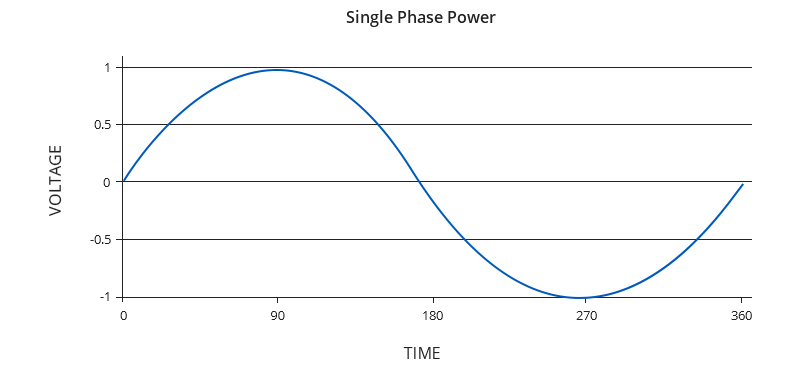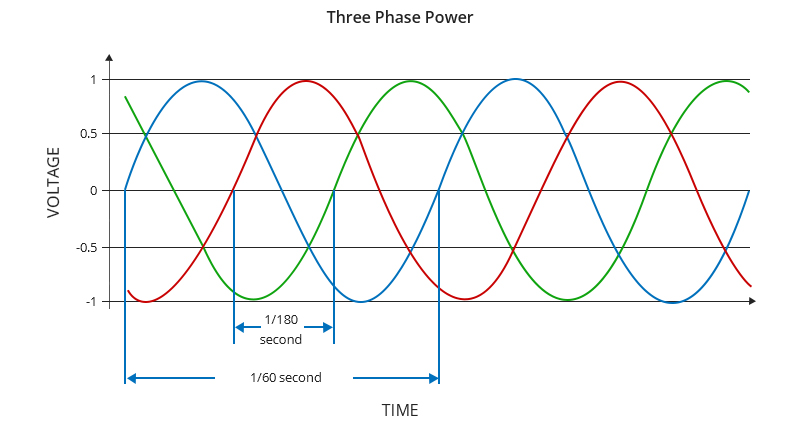Single Phase vs Three Phase UPS: What’s The Difference and How to Choose?
When purchasing UPS for your business or organization, many factors should be taken into consideration, among which the choice of power supply between single phase UPS and three phase UPS is the foremost one. Though both of the UPS offer consistent backup power for dealing with unexpected situations, they have different roles. Here is a brief introduction of single phase vs three phase for those who are unfamiliar with their difference.
What Is the Phase in Electrical Terms?
If you are new to the world of electrical power, you may know little about the term phase. Phase, at its most basic, is the distribution of electrical power, which shows the alternating current (AC) power supply varies with respect to the time period. There are one phase, two phase and three phase power supply types.
Single phase is commonly called “residential voltage” because it is widely available in homes. For example, the microwave oven, the coffee machine, your PC in your household can be single phase devices. In different regions there is a similarity for single phase connections: It requires two wires (one voltage wire and one neutral wire) for completing the circuit. The figure below shows the current flow in single phase AC power.

Figure 1: Single phase AC power
Two phase is basically the same thing as single phase, which consists of AC with two wires. It is also called the split phase. The power is supplied by either one of the two 120V power circuits in loads using low power circuits such as light, television, etc. Nowadays, three phase has replaced the original two phase power systems for power transmission and utilization.
Three phase power contains either 3 live wires or 4 wires (3 phase wires and a neutral one), providing three alternating currents, separated in phase angle. The total loads are shared by the three wires. Most commercial buildings in North America use three-phase, four-wire power setups.

Figure 2: Three phase AC power
UPS System—Single Phase UPS or Three Phase UPS?
UPS units come in two different formats: single phase and three phase. The common phase configurations for UPS are shown in the following chart:
| Input | Output | Nomenclature | US Mains Voltage |
|---|---|---|---|
| 1 Phase | 1 Phase | 1/1 | 120/120Vac, 60Hz |
| 3 Phase | 1 Phase | 3/1 | 220/120Vac, 60Hz |
| 3 Phase | 3 Phase | 3/3 | 220/208Vac, 60Hz |
Single Phase UPS System (1/1)
As shown in the chart, single phase UPS has a single input and output of 120Vac (for Canada and the U.S.). A single phase installation consists of two wires where AC voltage is a single sine wave. The standard voltage of single phase varies in different countries or regions. The standard single phase voltage in America is 120V and Europe, Asia or other regions take 230V as a standard voltage.
Three Phase UPS System (3/1 and 3/3)
The three phase UPS can be subdivided into three phase input/three phase output UPS system and three phase input/single phase output system types. If you need to connect to a three phase supply, you must need a UPS with a 3/x configuration. A 3/1 UPS takes in 3 phase power but delivers single phase to the downstream load while a 3/3 UPS not only takes in but also puts out 3 phase power.
What's the Difference Between Single Phase and Three Phase UPS?
The key difference between single phase UPS and three phase UPS are the following points:
-
Conductor: The number of the conductor in single phase and three phase system is different. Single phase UPS contains one conductor while three phase UPS supply power through three conductors.
-
Sine wave: Single phase UPS provides a single sine wave, while three phase UPS provides three sine waves, each out of phase and spaced 120° apart from each other.
-
Voltage: Single phase voltage is 120V in North America, while the phase to phase voltage for a three phase system is 220V, and the phase-to-neutral voltage is 120V.
-
Maintenance: The plug and play characteristic of single phase UPS makes it easier than three phase counterpart to install and set up without the need for outside installation.
-
Efficiency: For low power requirements, single phase UPS is more efficient that three phase UPS. But when the demand for power is higher, three phase UPS shows more efficiency to carry a greater load in a safer manner.
-
Cost: The equipment in three phase UPS system will have longer life expectancies and the transmission lines for three phase power do not need the heavy gauge copper wires as single phase UPS, thus, in the long run, three phase UPS will save more money.
-
Application: Single Phase UPS units are available in those applications with lower kVA requirements, generally less than 20kVA, such as homes, small business and satellite offices. Three phase UPS units are commonly used in large installations, such as data centers, and large industrial power applications with higher power requirements.
How to Choose Between Single Phase UPS and Three Phase UPS?
Whether single phase UPS system and three phase UPS system should be chosen depends on the power needs of your applications as well as what power source the equipment is connected to. You will need to confirm the load the UPS will protect and access their voltage range. Generally loads less than 20kVA can safely use the single phase UPS, or larger loads tends to use three phase UPS. Once you deicides the 3-phase UPS, the downstream loads that the UPS protects will judge whether 3/1 UPS or 3/3 UPS is the most suitable one. If you are interested in how to calculate your UPS needs, you can further refer to How to Figure Out the Required UPS Capacity?
You might be interested in
Email Address

-
PoE vs PoE+ vs PoE++ Switch: How to Choose?
Mar 16, 2023














